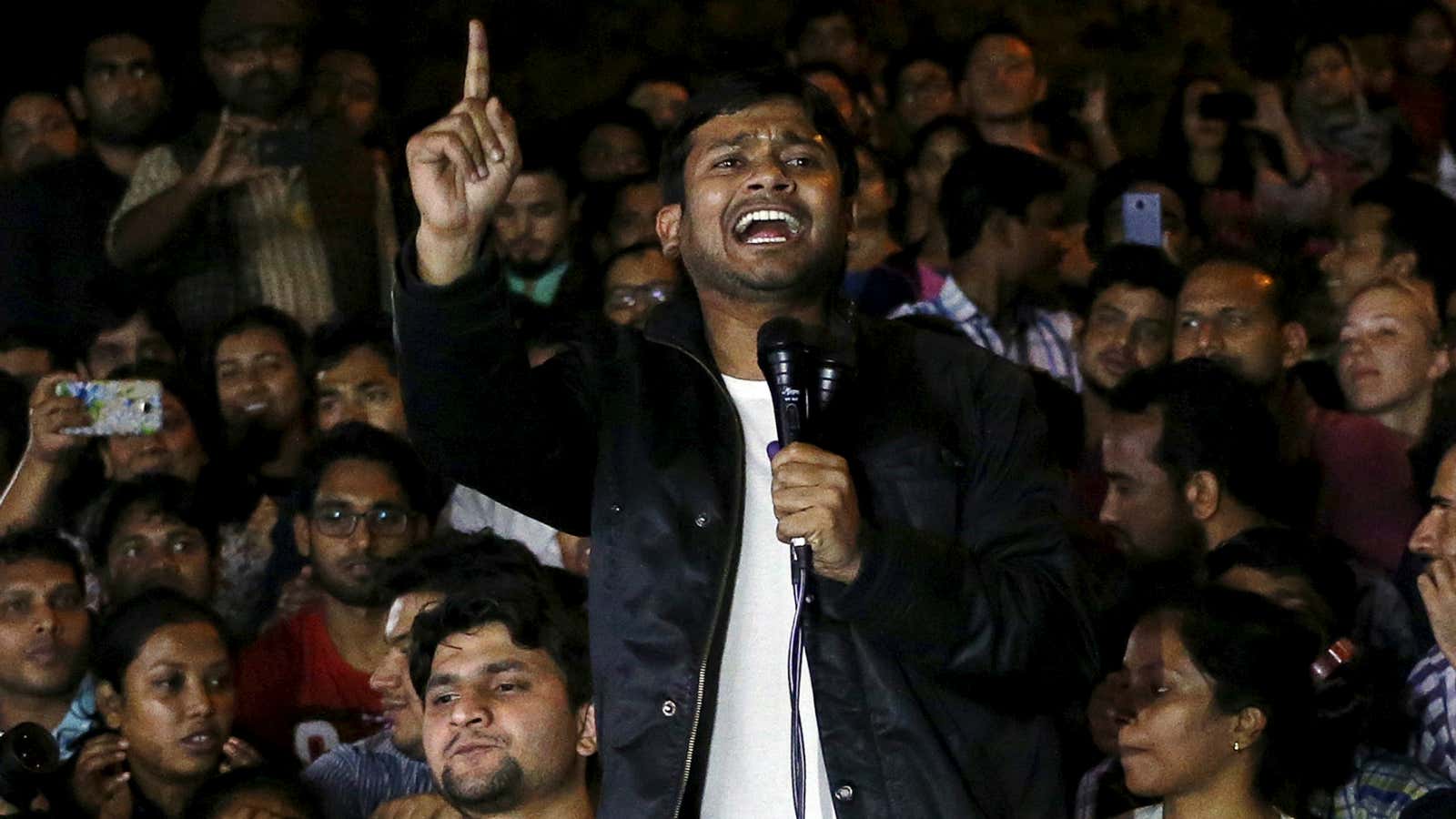Political discourse in India is dominated by Narendra Modi, with few serious challengers having emerged over the past few years.
Even in the face of the prime minister’s preeminence, some leaders have managed to create for themselves a respectable following across the country. These include the Indian National Congress president, Rahul Gandhi, and a clutch of regional leaders.
However, the politician—even if fledgling—whose rise may be the most frustrating for Modi and his devotees is Kanhaiya Kumar. Unheard of nationally till even 2016, the 32-year-old former student union leader is now a communist party candidate in this Indian election from the Begusarai constituency in the northern state of Bihar.
Kumar stands out for many reasons—oratory, earthiness, a rags-to-prominence story, and his fierce opposition to Modi. But what’s worst about him—from the Indian prime minister’s perspective, that is—is this: He is almost entirely a creation of the high handedness of the state machinery under the Hindu nationalist strongman.
The anti-national
On Feb. 09, 2016, Kumar, then president of the Jawaharlal Nehru University (JNU) Student Union, was arrested by the Delhi police for organising an allegedly seditious event at which anti-India slogans were reportedly raised. The event was in protest of the hanging of Mohammed Afzal Guru, a convict in the 2001 suicide attack on the Indian parliament.
Investigation showed later that Kumar was not present at the event at all. The identities of those who raised the seditious slogans are yet to be established. Nevertheless, the then doctoral candidate went on to spend around 20 days in jail, only to be released by the courts.
However, social media networks and some television news channels amplified the allegations against Kumar and a few other students. Within hours of the infamous event at JNU, India’s right-wing propaganda machinery had turned him into the figurehead of “anti-national” elements in India, and the renowned university their hub.
On the flip side, the student-activist also became a rallying point for many of those opposed to Modi and his Hindu nationalist Bharatiya Janata Party (BJP). In the treatment meted out to Kumar, they imputed everything that was wrong with the current dispensation in India: authoritarianism, illiberalism, creeping McCarthyism.
Kumar’s earthy, fiery oratory added to his image as the David battling the Goliath. Speaking mostly in Hindi, with a lilt straight from the heartland of Bihar, he generously mixes his theoretical wisdom with acerbic wit. So much so that the aazadi (freedom) chant he made famous at a JNU students’ gathering following his release from prison has by now gone on to become an anthem of sorts among his followers.
Fans and critics
“If the BJP had not gone overboard with their vendetta politics while misusing the might of the state and mishandling the entire situation of students politics, a legend like Kumar would never have been born,” S Vishwajeet Prasad, an author and political commentator, told Quartz via email.
Those who have seen the former student leader from close quarters vouch that he is grounded to Indian realities.
“I hope the issues he is raising become dominant. The subjects that he talks about are a combination of economics plus social justice. He is putting the focus back on the constitution’s basic principles. And he is doing all this in a very colourful and straightforward manner,” said Jayati Ghosh, professor of economics at JNU.
Needless to say, Kumar has his detractors, too.
Some have already begun suggesting financial impropriety on his part. For instance, his affidavit filed with the election commission declares himself unemployed, though Kumar himself has said earlier that he had earned Rs8.5 lakh (around $11,500) over the past two years.
Kumar’s affidavit states he earns money from freelance writing and guest lectures in educational institutions, besides royalty from his book Bihar to Tihar. The rookie politician has pooled in Rs70 lakh through crowdfunding—interestingly, the funding was achieved within a week of launching an online campaign.
His opponents aren’t buying any of this.
In Begusarai, meanwhile, it’s a three-cornered fight between him, one of Modi’s minister, Giriraj Singh, and the Rashtriya Janata Dal’s (RJD) Tanveer Hassan. Despite the buzz around Kumar, Singh hopes to repeat history. In 2014, the BJP had won the seat by over 60,000 votes against the RJD.
Begusarai is set to vote on April 29 in the fourth phase of India’s seven-phase election. Win or lose, it looks like Kumar is here to stay.
Read Quartz’s coverage of the 2019 Indian general election here.
